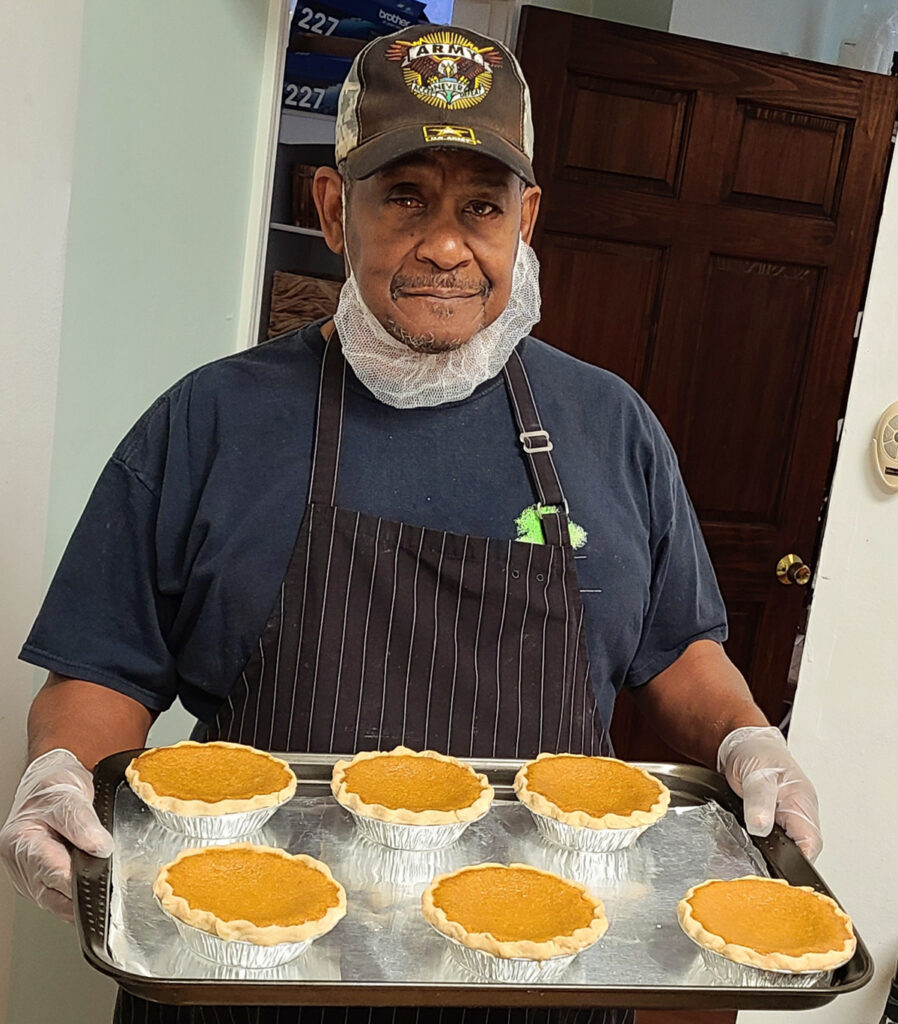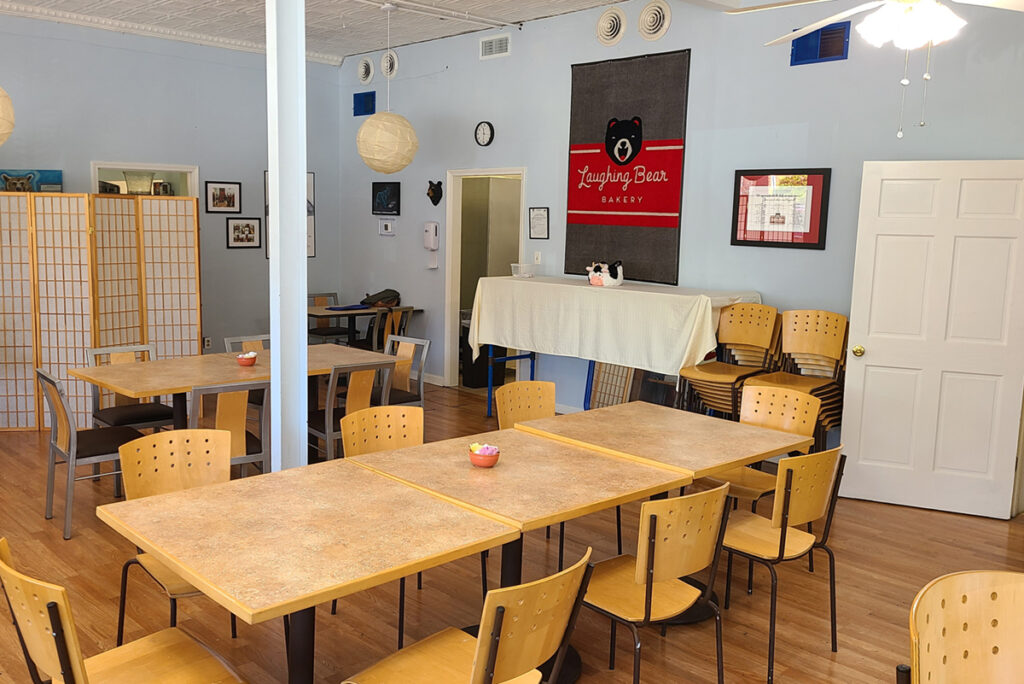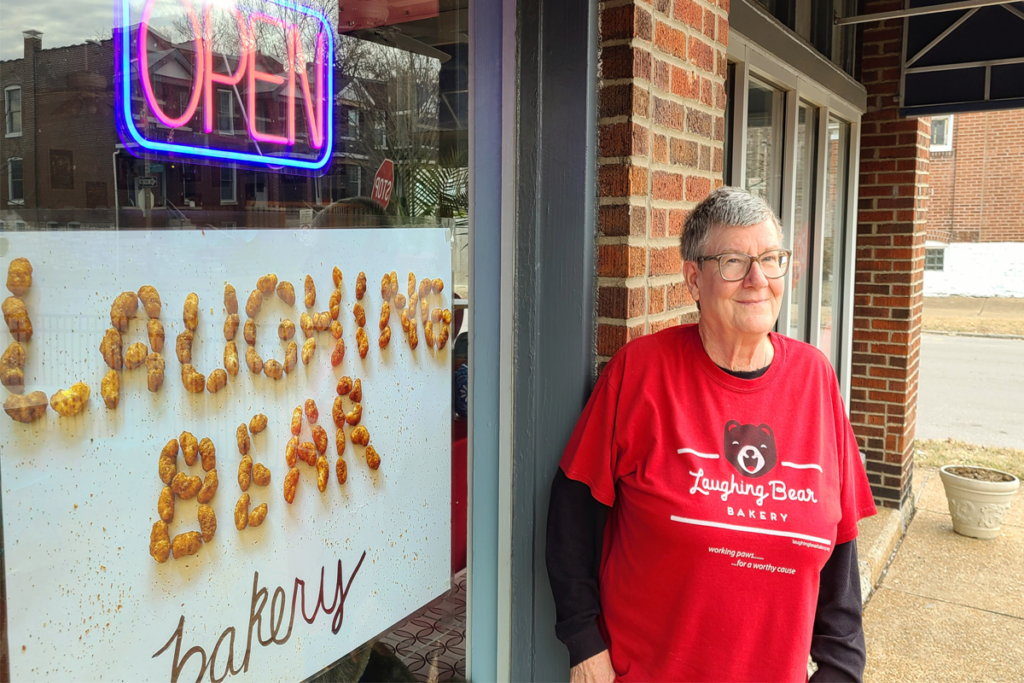Kalen M. has a modest appearance, a kind voice, and an impish snicker. She spent over a decade routinely driving 80 miles to and from Farmington Correctional Center: seven years as a visiting Zen Buddhist priest and five years as a prison chaplain.

Kalen often heard about the difficulties the men had upon release and why many end up incarcerated again. She left Farmington in April 2015 at the age of 65 and swore to find a way to help these individuals navigate re-entry challenges. By November of that year, she had founded Laughing Bear Bakery to provide employment to previously incarcerated individuals.
From kitchen to storefront
Kalen chose to make baked goods because of her background in chemistry. She worked for years as a science writer and had her own landscaping business. She says, “Baking is chemistry—exact measurement.”
Kalen also wanted to give her employees a chance to create something that they could be proud of and tasted good. She says the re-entry jobs often available tend to be unpleasant, such as refinishing floors or working at shipping docks.
Laughing Bear is named in honor of Kalen’s late friend, Victoria, a member of the Shoshone tribe, who handled the paperwork to get the business up and running. Kalen says Victoria had a great sense of humor. She chose her friend’s spirit animal—a bear—instead of her name to avoid confusion with the well-known lingerie store. She lets out a snicker.

Kalen raised $2,000 to start the business, rented out kitchen space at Carondelet Bakery, and hired two men. The money had run out after two weeks. Kalen says she sat down and told herself at least she had tried, and then the phone rang. A CEO wanted pies for each of his 80 employees and would be there in five minutes to prepay. The check covered the pies and salaries through December.
In January 2016, the bakery received a grant from Sisters of St. Joseph of Carondelet, which got them through spring and to outdoor market season. Finally, Laughing Bear was able to maintain its business.
Carondelet Bakery was sold in 2021 and Laughing Bear moved to a kitchen in a church downtown. Not long after, the church decided to open a childcare center. Kalen was asked if any of her employees were convicted of a sex offense. One of the rules she had established for her bakery was that no one could ask why someone had been incarcerated. So she raised money for a new location.
In July 2022, Kalen purchased a building at 4001 Utah St., in the Tower Grove Park South neighborhood.
Founding board member and former boss, retired deputy warden Mike Gann, drove up from Farmington daily for three weeks to paint five coats over the black walls, egg yolk yellow trim, and glowing purple ceiling. Kalen says there was a half of inch of grease on everything. A church group from Illinois came and scrubbed it clean. Stainless steel ovens, shelves, and tables were donated from Brown Shoe Co. when it closed its cafeteria. An oven was donated by Ford Hotel Supply and another was donated by a friend. Kalen says the neighbors were happy to welcome the bakery.
Laughing Bear is open Wednesday through Saturday mornings. Some of her employees must find other work to satisfy a 30-hour per week probation requirement.
Within the bakery, there are four working areas and two training areas. Kalen says a grant provides funding for two people to come in two days a week for a month to learn how to bake and potentially be hired. A group of volunteers package and label the products.
The bakery also has four large freezers for their customers who request large orders, including Washington University in St. Louis and Ole Tyme Produce. Kalen says, “If we got one more university, we could go full time.”

The stress of release
When Kalen worked as a chaplain, men would come to her with fears of how they’d manage after their upcoming release and how not having money would lead to reoffending. She says one of the first challenges of being released is the trip home. Men are given a one-way ticket to a bus station where the crime was committed, which may not be where the person lived.
She recalls one 72-year-old man who was given a ticket to St. Louis but lived 30 miles south of Kansas City. She raised the money to get him to Kansas City, but she says, “That was before Uber, and we couldn’t figure out how to get him home that last 30 miles—so he walked it.”
Men who are on parole must have a home plan—living with family or in temporary housing, such as a halfway house. Kalen says the men must report to a parole office a few hours after they first get home, but they may be unfamiliar with public transportation. “A lot of guys walk,” she says.
Men who complete their sentences are given $8.50 in cash along with their bus ticket. If they have no one to help them, Kalen says those men usually seek out “real” food first. “So, you go to McDonalds and your $8.50 is gone and you’re on the street… and good luck,” she says.
Non-profit organizations like Criminal Justice Ministry can make release easier by helping with housing (for veterans and those incarcerated for 10 years or more), hygiene items, basic clothing, and classes. Other groups, such as Employment Connection of St. Louis and Fathers & Families Support Center, have programs to aid re-entry.
Kalen says everyone in prison has a job, but it’s a challenge to save money. When she left in 2015, individuals in Farmington Correctional Center were paid a base rate of $8.50 per month, which often goes to toiletries or food. She says each prison has an industry—sewing mattresses, woodworking, or computer repair—in which the men can make $40 per month if they work a full day.
Working at Laughing Bear
Kalen says although many employers no longer have a checkbox for past felony conviction, they may ask to explain a gap in employment. A former incarceration can be looked up by social security number.
“Everyone is open to hiring, but they want someone to be the first,” Kalen says. She has offers from bakeries who want to hire “graduates,” a term she finds amusing, as she doesn’t think of it as a training program. She says, “People know when they’re ready to move on,” though she’s not always ready to let them go.
Kalen has fired employees. “I’m pretty strict. I don’t put up with a lot,” she says, “I figure if you’re ready for this, great. If you’re not ready, get out of the way and let somebody who’s ready move in.” She’s had to let people go for having a phone in the kitchen too many times or habitual tardiness.
Kalen understands her employees have challenges. When an employee explained he was 20 minutes late every day because he walked his son to school to avoid gangs recruiting his son, she shifted his time back an hour. She also knows parole officers sometimes set up meeting times that conflict with job hours.
The established employees often help newly released individuals adjust to life outside of prison and to know where to find resources, including giving their own bus passes to new employees. She says one employee was worried about being late the next day and was shocked to be told by another employee he could just let Kalen know.
Kalen says many men got used to being told what to do, have low self-esteem, and can be overwhelmed by the amount of space and options. They have admitted to having panic attacks in a public place, such as Walmart. A counselor has volunteered time to be available and Kalen has offered meditation sessions in the past.
Another rule at the bakery: if you mess something up, you gotta eat your mistakes. Kalen suspects they do it on purpose sometimes. One employee kept making his cookies too big, so she named the “Big O’s Chocolate Chip Cookie” after him. She says all their cookies are large now. “Unfortunately,” she says, “he’s one of the two guys who went back to prison.”

The Hardy Lombardi cookie was named after the late George Lombardi, who was Missouri Department of Corrections Director from 2009-2017 and on the bakery’s board of directors. Kalen would call George in times of uncertainty, and he often encouraged her to keep moving forward.
Bear Candy, a caramel-coated puffed corn treat, is one of the most popular items at the bakery and has been ordered by The Kennedy Center in New York. Kalen says one woman bought four bags for her kids and had to trek back after eating all four bags herself on the way home.
Some of her employees have moved on to work at other bakeries, in government positions, and in restaurant management. She smiles talking about one employee who got a job in construction after leaving the bakery. He later bought a car wash, got married, and has a child on the way.
Kalen wants everyone to succeed. She knows from her experiences as a teenager, some people are dealt more forgiving hands. She admits, “I just didn’t get caught. We’ve all done really dumb stuff.”
Groups from Germany, Jordan and Uzbekistan have visited the bakery to duplicate the program. Kalen recalls giving a presentation to some Uzbekistan prison workers who “looked mean,” but whose demeanor changed entirely when they brought out their baked goods.
Kalen would like to retire next year and hand over the store to someone else. Perhaps it will be Eric, in charge of the retail side and marketing. Eric writes plays and works with Prison Performing Arts, a literacy and performing arts program for those in Missouri’s criminal and juvenile justice systems. Another baker, LaWanda, works with the arts group and was interviewed in a story about the bakery on the Today show in Nov 2022.
Kalen laughs and says, “They would be in the kitchen rehearsing. I would be like, ‘C’mon, guys, I’m trying to run a bakery.’”
